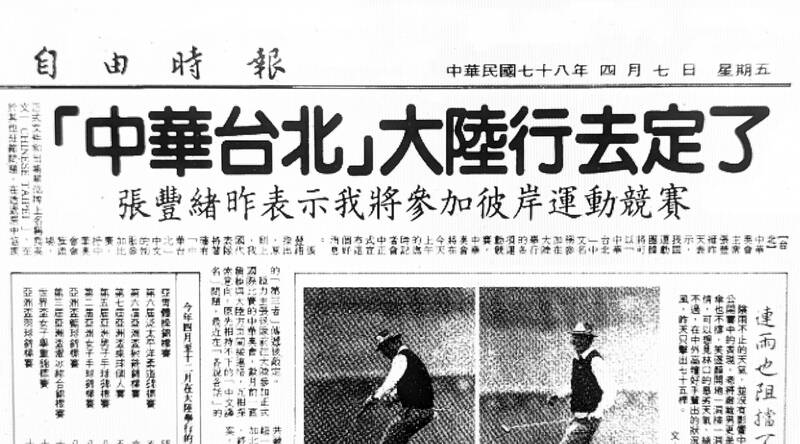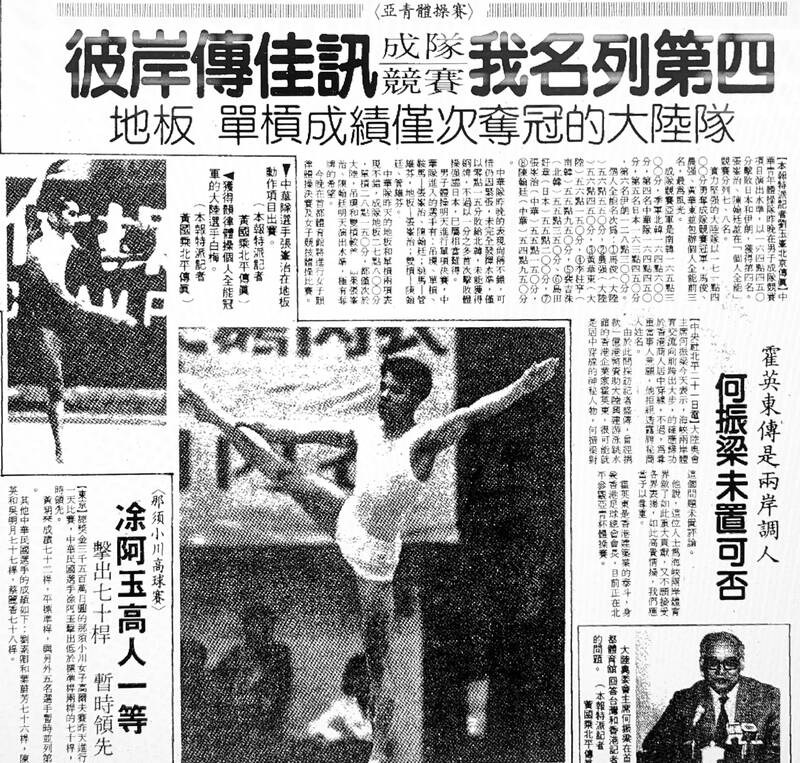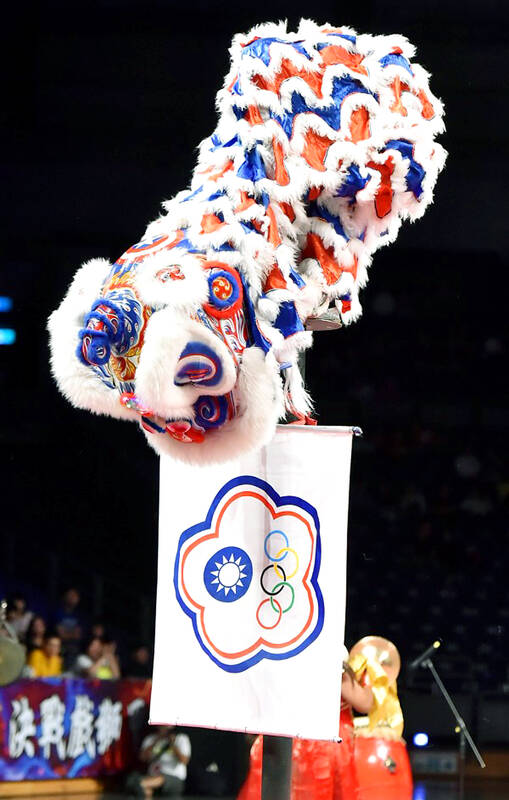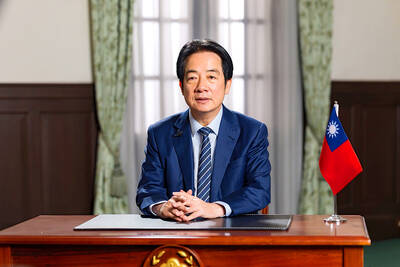April 17 to April 23
When asked in March 1988 whether Taiwan would participate in the upcoming Asian Games in Beijing, then-minister of foreign affairs Ting Mao-shih (丁懋時) replied: “According to current policy, we will not participate in any cultural, educational or sporting activities in mainland China.”
Starting from the early 1980s, Chinese sporting authorities had been reaching out to their Taiwanese counterparts as part of their “peaceful unification” strategy, inviting them to participate in events in China. However, the Chinese Nationalist Party (KMT) insisted on “no contact, no negotiation, no compromise” until the lifting of martial law in July 1987. Starting in November that year, people were finally allowed to visit their relatives in China after nearly 40 years of no contact.

Taipei Times file photo
Ting’s response was panned both locally and abroad as governmental interference in sports. In July 1988, the government decided that Taiwanese athletes could compete in China in accordance with International Olympic Committee (IOC) regulations, and left all such decisions to the national Olympic committee.
Taiwan had already been competing in international events as “Chinese Taipei” starting from the 1984 Winter Olympics, and it was decided that it would continue using the name during events in China. It took several months to hammer out the details, however, with one point of contention being the Chinese translation of “Chinese Taipei” — Taiwan had been using Zhonghua Taipei (中華台北), while China preferred Zhongguo Taipei (中國台北). The latter term indicated that Taiwan was just a locality of China, while the former is more ambiguous.
The two sides reached an agreement on April 6, 1989. On April 17, the 15-member youth gymnastics team arrived in Beijing for the Junior Asian Gymnastics Championships, becoming the first athletes to officially compete in China since 1949.

Taipei Times file photo
Then-Olympic committee director Chang Feng-hsu (張豐緒) told reporters that it was important to “peacefully and rationally” conduct this historic event as it would set the tone for future exchanges.
The trip went well and several other cross-strait athletic events ensued over the following years. But politically, things were far from amicable as Beijing continued to oppress and marginalize Taipei during international sporting events, lodging complaints at any opportunity and attempting to block Taiwan from hosting international games.
POLITICIZING SPORTS

Photo: Chang Chung-yi, Taipei Times
The “two Chinas” conflict in international sporting events began when both Taiwan and China were invited to participate in the 1952 Summer Olympics in Helsinki under the Republic of China and the People’s Republic of China respectively. Taiwan withdrew from the games in protest, which sparked a row that led to China quitting the IOC and missing the games for the next 32 years.
Although China didn’t compete, it continued to pressure the Olympic committee over Taiwan’s participation as the Republic of China. In 1975, China, which had supplanted Taiwan in the UN by then, applied to return to the Olympic committee under the condition that Taiwan be expelled. The committee rejected this bid, but its stance would soon change.
A year later, the Canadian government, which established ties with China in 1970, prohibited Taiwan from participating at the Summer Olympics in Montreal if it insisted on using the name Republic of China. Taiwan was unable to attend as a result.
Things only worsened as the US broke ties with Taiwan in 1979 and established diplomatic relations with China. In November that year, the Olympic committee voted to allow both Taiwan and China to compete in the 1980 Winter Olympics. The resolution, passed 62-17, prohibited Taiwan from using the Republic of China name, flag and anthem.
The two US delegates slammed this decision. Douglas Roby told the New York Times, “The Taiwanese have been members for 27 years and have been model members. And here we completely pull the rug from them. I think they have a right to have the flag and anthem they want. We don’t ask other people to change their flags and anthems.”
“We’re talking about a sporting event. Now the IOC has put itself into the political arena by taking orders from Peking,” Julian Roosevelt added.
The Taiwanese side protested but to no avail, missing both summer and winter events that year. In 1981, they reluctantly signed the agreement and competed under the name “Chinese Taipei” for the first time in 1984.
AFTER THE NAME CHANGE
Chinese and Taiwanese athletes often met in international events after Taiwan agreed to the name. In January 1984, the Executive Yuan announced that Taiwanese were allowed to interact and establish personal relations with their Chinese counterparts at overseas meets. Many cross-strait friendships were formed, but the political suppression of Taiwan continued.
At the 1988 Winter Olympics in Calgary, the Taiwanese team was warned by the Olympic committee for displaying ROC flags on their helmets. They called it an “extremely important” matter and threatened to disqualify the athletes and suspend Taiwan’s Olympic committee.
Beijing also flew into a rage after the airport greeter held up a sign that said “Republic of China delegation” during the 1988 Summer Olympics in Seoul, taking the matter to the Olympic committee. It didn’t matter that South Korea was still allied with Taiwan then, it could only follow the rules and ban the ROC flag.
Nevertheless, in 1989, the government made it legal for Taiwanese athletes to travel to China — but only for official events organized by international bodies that Taiwan was a member of.
On March 1, 1989, Chi Chien-hung (齊劍洪), director of the National Sports Training Center, flew to Beijing and personally requested that the Chinese Olympic Committee meet its Taiwanese counterparts in Hong Kong to settle the matter regarding the translation of Chinese Taipei. The two sides met twice, with China finally agreeing to Taiwan’s preferred title.
At the pre-departure press conference, the junior gymnastics team leader Chan Te-chi (詹德基) first introduced themselves as the “Chinese team” before adding, “We’ll be calling ourselves ‘Chinese Taipei’ at official events once we reach the mainland.” The team took great care to avoid any political trouble, reported the Minsheng Daily (民生報), making sure there weren’t ROC flags or political messages on any of their personal materials, clothing and gifts, and instructing the young gymnasts not to answer any questions outside of sports, family and academics. They were also told to refrain from singing any patriotic songs at banquets, instead using the indigenous-themed song High Green Mountains (高山青) on such occasions.
Sports journalists were sent to Beijing for the first time to cover the event. Veteran photojournalist Hsieh San-tai (謝三泰) was one of them. In addition, he was also tasked by the Independence Evening Post (自立晚報) to cover the Asia Development Bank’s annual meeting as well as Soviet Union president Mikhail Gorbachev’s visit. The bank meeting was also historic as then-minister of finance Shirley Kuo (郭婉容) became the nation’s first cabinet member to visit China.
Hsieh recalls in a Taiwan Gazette (台灣誌) article that the democracy demonstrations at Tiananmen Square had started up just as he landed, and he headed straight to the scene without dropping off his luggage at the hotel.
He stayed for over a month as the protests intensified, but the newspaper wanted him to return to Taiwan due to safety concerns. Hsieh quit his job in response, but the photos only appeared 30 years later when he published them in the book, Howling 1989 (吼叫一九八九).
Taiwan in Time, a column about Taiwan’s history that is published every Sunday, spotlights important or interesting events around the nation that either have anniversaries this week or are tied to current events.

This month the government ordered a one-year block of Xiaohongshu (小紅書) or Rednote, a Chinese social media platform with more than 3 million users in Taiwan. The government pointed to widespread fraud activity on the platform, along with cybersecurity failures. Officials said that they had reached out to the company and asked it to change. However, they received no response. The pro-China parties, the Chinese Nationalist Party (KMT) and Taiwan People’s Party (TPP), immediately swung into action, denouncing the ban as an attack on free speech. This “free speech” claim was then echoed by the People’s Republic of China (PRC),

Most heroes are remembered for the battles they fought. Taiwan’s Black Bat Squadron is remembered for flying into Chinese airspace 838 times between 1953 and 1967, and for the 148 men whose sacrifice bought the intelligence that kept Taiwan secure. Two-thirds of the squadron died carrying out missions most people wouldn’t learn about for another 40 years. The squadron lost 15 aircraft and 148 crew members over those 14 years, making it the deadliest unit in Taiwan’s military history by casualty rate. They flew at night, often at low altitudes, straight into some of the most heavily defended airspace in Asia.

Many people in Taiwan first learned about universal basic income (UBI) — the idea that the government should provide regular, no-strings-attached payments to each citizen — in 2019. While seeking the Democratic nomination for the 2020 US presidential election, Andrew Yang, a politician of Taiwanese descent, said that, if elected, he’d institute a UBI of US$1,000 per month to “get the economic boot off of people’s throats, allowing them to lift their heads up, breathe, and get excited for the future.” His campaign petered out, but the concept of UBI hasn’t gone away. Throughout the industrialized world, there are fears that

The Democratic Progressive Party (DPP) controlled Executive Yuan (often called the Cabinet) finally fired back at the opposition-controlled Legislative Yuan in their ongoing struggle for control. The opposition Chinese Nationalist Party (KMT) and Taiwan People’s Party (TPP) acted surprised and outraged, but they should have seen it coming. Taiwan is now in a full-blown constitutional crisis. There are still peaceful ways out of this conflict, but with the KMT and TPP leadership in the hands of hardliners and the DPP having lost all patience, there is an alarming chance things could spiral out of control, threatening Taiwan’s democracy. This is no